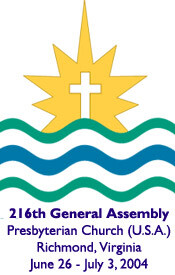Presbyterian Church (USA) 2 July 2004

Divestment is one of the strategies that U.S. churches used in the 1970s and ’80s in a successful campaign to end apartheid in South Africa.
The vote was 431 to 62 to have the church’s Mission Responsibility Through Investment Committee (MRTI) study the matter and make recommendations to the General Assembly Council (GAC).
When a handful of commissioners expressed reservations about the action, the Rev. Mitri Raheb, a Lutheran pastor from Bethlehem, an ecumenical guest at the Assembly, said divestment is important because it is a way for the churches to take direct action. For too long, he said, the churches have simply issued statements — and that is not enough.
“We have to send strong messages to such companies,” Raheb said, referring specifically to Caterpillar Inc., the American builder of the armored tractors and bulldozers the Israeli army uses to demolish Palestinian homes.
“Sisters and brothers, this is a moment of truth,” Raheb said.
The Rev. Victor Makari, the PC(USA)’s liaison to the Middle East, supported the divestment strategy, saying, “I think the issue of divestment is a very sensitive one with Israel. … If nothing else seems to have changed the policy of Israel toward Palestinians, we need to send a clear and strong message.”
The divestment action also calls for the United States to be an “honest, even-handed broker for peace” and calls for “more meaningful participation” in peace negotiations by Russia, German, France and others. It also encourages the U.S., Israeli and Palestinian governments to “lay aside arrogant political posturing and get on with forging negotiated compromises that open a path to peace.”
In other actions related to Israel, the Assembly voted by large margins to condemn Israel’s construction of a “security wall” across the West Bank; disavow Christian Zionism as a legitimate theological stance and direct the denomination’s Middle East and Interfaith Relations offices to develop resources on differences between fundamental Zionism and Reformed theology; and study the feasibility of sponsoring economic-development projects in Palestine and putting an action plan in place by 2005.
The actions on Israel were forwarded to the Assembly by the Peacemaking Committee.
Related Links

